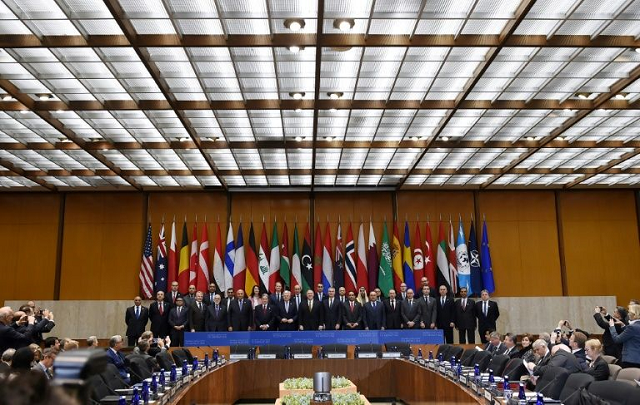US, Europeans clash on militants' fate in Islamic State talks
As senior officials from more than 30 countries held a meeting in Washington

Senior officials of more than 30 countries pose before talks in Washington on fighting the Islamic State group. PHOTO: AFP
Senior officials from more than 30 countries pledged greater coordination in the campaign against the militant Islamic State group in a meeting in Washington proposed by France, which has been particularly concerned by President Donald Trump's decision last month to pull US troops from Syria.
Trump's move allowed an incursion by Turkey aimed at destroying Kurdish guerrillas, who had led the fight against the IS and run jails for captured militants in their effectively autonomous area in northern Syria.
US to keep around 600 troops in Syria: Pentagon chief
Secretary of State Mike Pompeo pressed the Europeans on foreign fighters, telling them, "we'll hold them to account."
"Coalition members must take back the thousands of foreign terrorist fighters in custody and impose accountability for the atrocities they have perpetrated," Pompeo said.
But Nathan Sales, the State Department's counterterrorism coordinator, acknowledged that "there is, candidly, a difference of opinion about the best way to resolve this problem."
"The United States thinks that it's inappropriate to ask Iraq in particular to shoulder the additional burden of foreign fighters, particularly from Europe," Sales told reporters after the one-day meeting.
"It would be irresponsible for any country to expect Iraq to solve that problem for them," he said.
"We think there should be a sense of urgency to repatriate now while we still can," he said.
Sales's comments clearly were directed at France, which has opened talks with Iraq about trying foreign nationals.
European nations such as France and Britain have no desire to see the return of battle-hardened supporters of the ultra-violent group, which has claimed responsibility for a slew of grisly attacks against civilians.
French Foreign Minister Jean-Yves Le Drian said his government was seeking the "certain and lasting detention" of fighters and noted that the vast majority of prisoners were Iraqis and Syrians.
"For our part, we will continue to say that they should be tried as close as possible to the crimes they committed," he told reporters.
"Let's never forget that these women and men who joined Daesh made a fully conscious choice to fight for a terrorist organisation," he said, using the group's Arabic initials.
European governments have revoked the citizenship of a number of citizens over alleged IS links.
Such a step is virtually impossible in the United States, although a court on Thursday backed the State Department's finding that one US-born recruit, Hoda Muthana, did not have US citizenship as her father was a diplomat from Yemen.
Trump argues that the United States accomplished its military mission in war-ravaged Syria by crushing the IS group, although he has since said that US troops will stay on to secure oil fields.
Pompeo dwelled little on Trump's decision but said US forces remained positioned to "make sure ISIS will never get a second wind," using a common acronym for the group.
"The United States will continue to lead the coalition and the world on this essential security effort," Pompeo said.
He scoffed at criticism of Trump's move, pointing to the October 26 raid by US forces that killed the group's chief Abu Bakr al-Baghdadi as well as an operation that killed his would-be successor.
"Ask them if there's a deficit of American leadership in fighting ISIS," Pompeo said.
Turkey to deport American Da'ish detainee after Greece slams door
The talks came a day after Trump welcomed Turkish President Recep Tayyip Erdogan to the White House, a rapid turnaround in symbolism just weeks after Trump threatened to destroy the NATO ally's economy over its incursion.
NATO Secretary-General Jens Stoltenberg, speaking alongside Pompeo, acknowledged that there were "differences" among alliance members on Syria, where the situation he said "remains fragile and difficult."
But Le Drian said France felt reassured by a joint statement's reaffirmation of a coalition, saying that all members agreed "to avoid unilateral steps without consulting with others."
The ministers also said they would hold a meeting next year focused on the IS group in West Africa, where the militants have staged increasingly destructive attacks.



















COMMENTS
Comments are moderated and generally will be posted if they are on-topic and not abusive.
For more information, please see our Comments FAQ